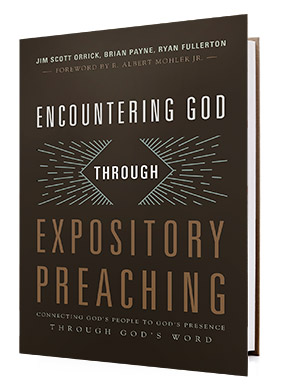Encountering God through Expository Preaching: Connecting God’s People to God’s Presence through God’s Word (B&H Publishing 2017, $19.99) Jim Scott Orrick, Brian K. Payne, and Ryan Fullerton
He preacher’s task is not just a Sunday morning endeavor. Instead, it involves much preparation and investment — seven days a week. While this task is essential to the flourishing of the church, expositional preaching is often lacking in many of today’s churches, at the detriment of the people who fill the pews each week. 
In their new book, Encountering God through Expository Preaching: Connecting God’s People to God’s Presence through God’s Word, Boyce College professors Brian Payne, Jim Orrick, and Immanuel Baptist Church’s senior pastor Ryan Fullerton explore various reasons expositional preaching is necessary for pastors to implement in their church services.
“Making the truth plain is what an expository preacher does,” they write. “When the main point of the text is the main point of the sermon, the preacher has the assurance that the Lord himself is coming to speak and act. That is, the Lord’s power, authority, and presence are eruption to make things new.”
From the beginning, the authors integrate the importance of expositional preaching with an equal need: the holiness of the preacher himself. “He [God] blesses men actively seeking holiness in all of life’s struggles right alongside God’s people.”
The authors emphasize the definition of preaching as the invitation of a pastor to his congregation to “come and experience God with me in this text.” If the preacher is not experiencing the holiness of God, they write, the congregation cannot follow them. The holiness of the preacher is the first place to begin. “God desires the ministry of preaching and teaching to be done by men who are holy, qualified, and progressing.”
Each of these aspects — holiness, qualifications, and progressing in faith and skills — all work together to help a preacher as he grows in expositing Scripture. Encountering God through Expository Preaching provides readers with helpful anecdotes and biblical evidence for the benefits of expositional preaching. The authors address common topics of discussion regarding preaching, like topical sermons, various methods of sermon preparation, preaching from a manuscript versus preaching without notes, and the indispensable aspect of the Holy Spirit’s work during the preaching of the Word of God.
Three chapters are dedicated to “The Sermon and the Spirit,” emphasizing the Spirit’s involvement in moving within hearers’ hearts during sermons. “The Spirit of God who wrote the Bible,” they write, “is also the Spirit of God who illumines the Bible. The One who inspired the objective Word of God also illumines our darkened hearts to delight in it and proclaim it.”
In addition to the Holy Spirit’s work through preaching, the authors encourage preachers to “seek answers from the text that the text itself is asking.” Preachers accomplish this through asking what the text says in relation to the whole counsel of Scripture. Preachers need to evaluate four “horizons” of the text: contextual (immediate context), covenantal (context of the period of revelation), canonical (context of the entirety of revelation), and contemporary. Each of these aspects help preachers discern what to focus on in their sermon, and how to exegete while remaining faithful to the original intention of the text.
Orrick concludes the book with an exhortation to young preachers to focus on preaching the Word of God with sobriety and faithfulness that proves fruitful, even when difficult. “Be a holy man of God,” he writes. “Ask him to fill you with his Holy Spirit. Spend your days walking with God. Every time you have the opportunity, stand up like a man, open the Word of God, look your hearers in the eye, lift up your voice like a trumpet, and say with every fiber of your being, ‘Come! Encounter God with me in this text.’”




